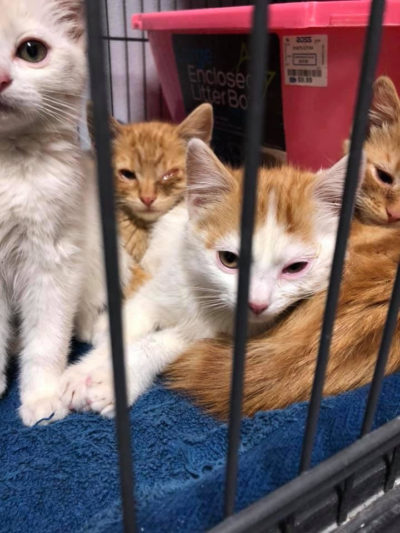
ST. GEORGE — During the past year, new pet owners have come to realize something long-time owners have known for years: Their adopted loved ones help them cope with loneliness and isolation.
“The proof is in the pudding,” Frank Deford, National Public Radio commentator, once said.
Since March 2019, the pet industry has experienced a major sea change in the number of people adopting pets. Retail stores, shelters and breeding facilities have all reported a significant rise in the number of adoptions primarily because of COVID-19 isolation protocols.
Shelter Animals Count, which runs a national database that tracks shelter and rescue activity, has analyzed pet adoptions during the pandemic. The group tracks approximately 500 rescue organizations across the United States. It recorded 26,000 more pet adoptions in 2020 than in 2019 — a rise of about 15%.
Among those surveyed, Colorado’s “4 Paws 4 Life” said its dog adoptions nearly doubled during the first eight months of 2020, compared with a year earlier.
Officials from the organization say that many people who adopted pets reported they needed “an emotional support animal” to survive the pandemic.

The rise in pet adoptions has become so extreme, the Washington Post and other news outlets have reported, that across the country – including in Southern Utah – there are shortages of animals to take home.
Some shelters and rescue groups, the Post reported, are experiencing more than double the typical number of requests to adopt since the pandemic hit the United States.
It’s not just our canine friends that are in high demand.
At “Homeward Bound Cat Adoptions” in Nevada, nearly 500 cats were adopted in the first eight months of 2020, compared to 200 during the same time one year before.
For mental health experts, this increase comes as no great surprise.
Christine Chew, Ph.D., an associate professor with Dixie State University, said pets can bring a level of mental comfort that human family members and friends often can’t provide.
“What is important is that we are there for them,” Chew said. “It’s about being loved for who we are, something we often don’t get growing up with our parents or friends. This is truly what pets offer – the ability to show unconditional love.”
“Basically, pets don’t judge us,” Chew adds. “They have a lot of positive energy and are generally kind-hearted in nature. They are always happy to greet their owners when they come home. They are very loyal and humans thrive on this attention and not being judged for our actions.
“It’s hard for humans to let go of what they want others to be, or how others should act, and pets don’t do that. They don’t have judgmental agendas. All they want is to be loved and give love in return.”
Chew added that pets don’t play guilt trips or mind games, and that has a “huge” role in helping survive during mentally challenging times.
Several recent studies support the belief that “pandemic pets,” as they are now being called by mental health experts, provide stable support and therapeutic benefits especially during stressful times, but the knowledge of a pet’s calming influence is well-established.
The first research on pets and mental health was published 30 years ago.
Psychologist Alan Beck of Purdue University and psychiatrist Aaron Katcher of the University of Pennsylvania conducted the first study that measured what happens to the body when a person has bonded with an animal.
The study suggested that signs of stress were reduced by having an animal in the home. Blood pressure decreased, heart rate slowed, seizures were reduced in autistic children and adults, breathing became more regular and muscle tension relaxed.
The researchers discovered there was direct physical evidence of the benefits of owning a pet.
Although the first research focused on the interaction between humans and dogs, it has since expanded to include nearly every animal whether it is a bird, hamster, goldfish, snake or our furry feline friends.
According to a 2015 Harris poll, 95% of pet owners think of their animal as a cherished member of the family.
The bond between humans and their pets is very powerful, Chew said.
The bond is so strong, she added, animal-assisted therapy programs in hospitals, nursing homes, and assisted care facilities have become a common part of “effective” mental and physical health treatment.
Regardless of the statistical data, ask any animal lover about their pet and they can spend hours recalling the fun and foibles each day brings with the adopted member of the family.

“I just love Emmie,” said 8-year-old Jessica Tandent of Henderson, Nev., when talking about her new cat. “We just got her a little while ago and she’s my best friend. She lays on me every night and just looks at me. She kisses my face and always wants her belly rubbed. Emmie is so funny.”
Jessica’s mother Kate said the past year has been especially hard on her daughter because of COVID-19 isolation and not being able to see her friends at school.
“She started getting really stressed out being at home so much,” Kate Tandent said. “Our family knew that we had to do something.”
That something was Emmie, an 8-year-old, black and white “chubby fur ball” of a cat with a “mellow” disposition and an “adventurous spirit,” Tandent said.
Research has concluded that pets may protect children from anxiety.
A 2015 study conducted by the Centers for Disease Control and Prevention, looked at more than 640 children with a dog at home and found that anxiety levels were worlds apart from children without a pet.
Slightly more than 20% of the children who did not have a pet dog tested positive for anxiety while only 12% who had a four-legged companion at home tested positive.
The researchers concluded that there was a clear and beneficial effect of pet ownership on childhood stress and anxiety. The research also indicated that children who grew up with pets may have had a better chance of becoming happier and healthier teenagers.
Jessica’s mother said she was also becoming withdrawn, seeming to lose the zest of life most children shared prior to the psychological challenges of COVID-19, and Emmie turned things around.
“Emmie has really brought her out of her shell,” Kate Tandent said. “We’ve never had a pet before and it’s been amazing to see the difference in my daughter’s life now from what it was six months ago. Even her favorite things to do didn’t create much excitement. Now, it’s always ‘let’s go see what Emmie is doing.’”

The answer to what she is doing was enviable. Emmie is often found sleeping under the quilt on Jessica’s bed. But when aroused, the two play together for countless hours, Tandent added.
“Pets help because kids don’t know how to ask for help,” Chew said. “We got a puppy at the beginning of COVID and I wonder what would have happened to my family without her. She’s really pulled us through the difficulties during the past year. It’s been her antics and sense of humor that’s really made a difference.”
According to the California-based Newport Academy – which offers evidence-based healing programs for adolescents and families struggling with mental health issues, eating disorders and substance abuse – people feel more needed and wanted when they have a pet.
The act of caretaker has mental-health benefits, the academy noted in its research. Experts in the field say it gives people struggling with mental health issues a sense of purpose and meaning.
“Humans have both physical and mental needs,” Chew said. “And, the needs often define the sense of purpose and meaning. It’s how we make sense of life. When our needs don’t get met that’s when things go haywire and get weird. Pets really can enhance someone’s life beyond belief.”
It’s not just the young who benefit from pet ownership, but the elderly as well.
In a 2016 study involving pets, mental health and the elderly a group of people 65 years and older were given five crickets in a cage to care for with researchers monitoring their mood during an eight-week period.
During that time, the participants became less depressed than those in a control group who were without the responsibility of caring for an orchestra of crickets. Researchers concluded that caring for any living creature – even a cricket – reduced depression and loneliness.
More recently, psychologists at Miami University and Saint Louis University conducted three experiments on the benefits of pet ownership and published the results with the American Psychological Association.
In the first study, more than 215 people answered questions about their well-being, personality type and attachment style. Pet owners were reported to be happier, healthier and better-adjusted than non-owners.
A second experiment involved 56 dog owners and their feelings about the pets. A majority of respondents said that their dogs increased feelings of belonging, self-esteem and gave meaning to life.
The third study involved nearly 100 undergraduate college students with an average age of 19. Researchers found that pets helped them feel better mentally and adjust quicker after experiencing rejection.
The difference between humans and animals, mental health experts say, is that pets live in the moment and worry about what happened yesterday and aren’t concerned about what might happen tomorrow.
This is a life skill that parents are often unable to provide. Chew said.
“Pets teach us to be alive,” she added. “They are steady, loving members of our family that touch our souls.”
This research indicates that pets can also help people become more mindful.
Mindfulness is the psychological process of bringing one’s attention to the present moment. Pets can help not only teens but someone of any age who wants to enjoy and appreciate life as it comes and not to dwell on the past or stress about the future along with learning how to deal with day-to-day social isolation.
Survey reports from Mars Petcare, Washington State University and OnePoll (on behalf of Zoetis Petcare) contributed to this article.
Copyright St. George News, SaintGeorgeUtah.com LLC, 2021, all rights reserved.